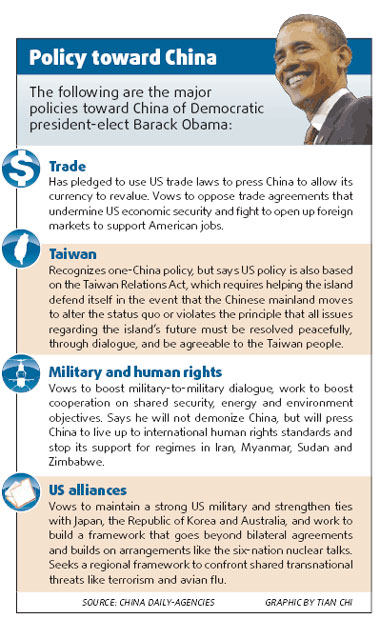US president-elect Barack Obama's administration will adhere to the United States' existing China policies, his top China advisor, Jeffrey Bader, has said.
Deepening domestic economic concerns, Iraq and Afghanistan would top the agenda of US voters, Bader told the Chinese press prior to yesterday's election.
Obama will deal with China issues in a "most modest and pragmatic" manner, he said.
The Brookings Institution's China Center chief stressed that his country's China policies have witnessed a fairly strong continuity, and that a sound, stable US-China relationship, predicated upon mutual trust, is an important cornerstone of US foreign relations.
At the core of future US-China relations will be common challenges such as nuclear threats, terrorism in Afghanistan and Pakistan, global warming, energy safety and relations with African countries, Bader said.

In an earlier interview, he said China's rising confidence comes at a time when "the US is not at the peak of the game That puts us on a different playing field".
Bader, who was President Clinton's National Security Council Asia specialist and handled the mainland's and Taiwan's accession to the World Trade Organization under President Bush, has been behind Obama's stances on several China issues such as Tibet, Taiwan, trade and the environment.
Obama, who did not attend, and called for a boycott of the opening ceremony of the Beijing Olympics in August, criticized President Bush for the latter's presence at the event.
"It strikes me that although some meetings have been taking place, that we were not aggressive in encouraging the Chinese government to make serious concessions there," he said in relation to China's talks with the Dalai Lama.
Obama is also vocal on relaxing tensions across the Taiwan Straits, and wants China to reform its intellectual property system, Bader said.
Obama's campaign believes that while Chinese involvement in the DPRK issue has been helpful, its sanctions against and pressures on the Iranian government are less than the levels necessary, he said.
He also called for China to play a more proactive role in coping with the world's financial crisis and other issues of global concern, where the US plays a leading role.
The 62-year-old Bader has worked at the US State Department, the National Security Council, and the US Trade Representative's office for nearly three decades, analyzing China issues under five administrations.
He was senior vice-president of Stonebridge International, a global business strategy firm, and also briefly the US ambassador to Namibia between 1999 and 2000.
(China Daily November 6, 2008)